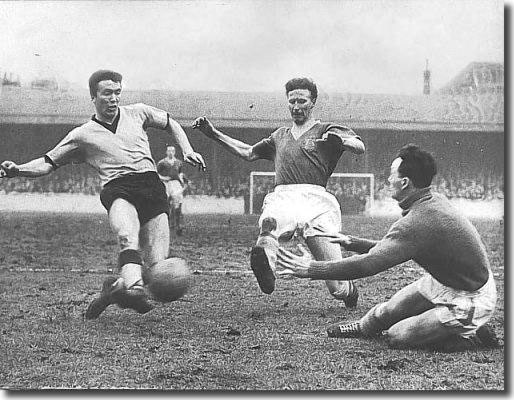 Part
2 - The Difference
Part
2 - The Difference
For Leeds United, 1961 was a watershed year: they had been down among
the dead men of the Second Division for twelve long
and miserable months and memories of the legendary John
Charles were dim. The playing staff was now populated by much more
prosaic forces, with few precious gems to punctuate the gloom: Billy Bremner,
at just 18, was an explosive talent on the right flank, while big Jack
Charlton, though exhibiting the odd glimpse of latent ability at the
rear, demonstrated complete disrespect for both off-field authority and
on-field discipline.
John McCole was a reliable goalscorer, black South
African Albert Johanneson an emerging force on the left and the ageing
full-back, Grenville Hair, could still demonstrate many of the touches
that took him to the verge of full England honours, but the side as a
whole was limited in ability and application.
On the plus side, the club was managed by an intelligent and thoughtful
force for the future, former England
inside-forward Don Revie, Footballer of the Year in 1955 and focal
point of the Revie Plan which had won Manchester City the FA Cup a year
later.
Revie, appointed in March, was a managerial novice, but had an incisive
knowledge of the game. Eager to learn the nuts and bolts of his trade,
he was keen to break new ground. One of his earliest steps in the job
was to cross the Pennines and seek the advice of Matt Busby, the charismatic
guiding force behind Manchester United.
Busby was a ready, willing and able tutor, advising that a consistent
pattern and approach should permeate the entire playing organisation,
with youth players schooled in the same style that the first team practiced.
He also counselled on the wisdom of growing your own.
For all his approachability and support, however, Busby remained fiercely
partisan and professional. His stint as Revie's mentor did not deter him
from attempting to entice Jack Charlton to Old Trafford that summer as
Revie set about fashioning his own blueprint for the future.
It didn't take much to persuade Jack to consider a move - he had long
been a disruptive and difficult influence in the dressing room, embittered
by managerial incompetence and fear of wasted potential. He was a constant
thorn in managerial flesh and had not impressed Revie: 'When I joined
Leeds United as a player, I was amazed to find how undisciplined Jack
was. He was one of the most awkward customers it had ever been my misfortune
to meet. Whether it was because the club had never had much success or
not I have no idea. But in all matches, Jack wanted to run about all over
the place. He seemed to think that if he didn't do it, no-one else would.'
Charlton's disregard for both tactics and the needs of colleagues prompted
Revie to snap, 'The best thing that could happen to you would be for the
club to leave you out. You're ruining it for the rest of us with that
chip on your shoulder. If I were manager, you'd never do for me.' Charlton
shrugged off the comment with the disdain that characterised his entire
approach to life, never guessing that Revie's offhand prediction would
soon be realised.
However, Jack Charlton was not as laissez faire when it came to money,
and he was enraged by one of Revie's early decisions. The manager had
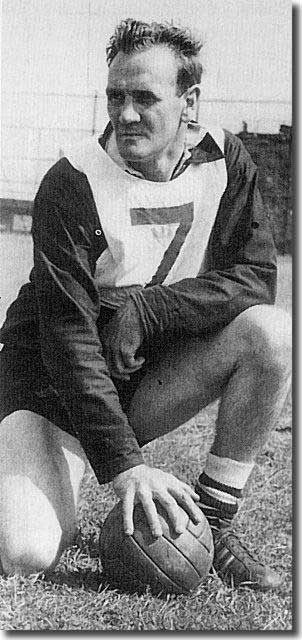 rightly
identified the lack of team spirit as a deep rooted cancer. He decided
to do away with pay differentials between first team players, opting instead
to improve incentives.
rightly
identified the lack of team spirit as a deep rooted cancer. He decided
to do away with pay differentials between first team players, opting instead
to improve incentives.
Bagchi and Rogerson in The Unforgiven: 'For a club in Leeds' predicament
the package of up to £43 10s per player per week was enormous, but the
fine print, as so often, revealed that the Board retained the upper hand.
The basic wage was increased to £20 per week, to be supplemented by a
£5 appearance fee, a £4 win bonus and a complex sliding scale of incentives
aligned to attendances above 20,000. To qualify for the full bonus of
£14 10s, Leeds would have to draw a crowd of more than 31,000 - a gate
of 18,000 above the previous year's average. It's hardly surprising that
it was the ever obstreperous Charlton who saw through this scheme and
asked to be transfer listed. Convinced that senior players naturally deserved
a greater salary than the juniors, he was only persuaded to sign the new
contract (which ensured him £14 in the close season) in early July on
the proviso that Leeds would release him if an acceptable bid was received.'
Indeed, Charlton was so incensed by developments that he refused Revie's
perverse offer of the club captaincy. Brother Bobby, a major star at Manchester
United, mentioned Jack's dissatisfaction to his manager and Busby started
making overtures to the player about a move to pastures new, suggestions
that enthused the older brother.
A combination of Revie's stubbornness and the meanness of the Leeds board
resulted in an asking price of £26,000, giving Busby pause for thought.
The valuation was way above his own and he decided to shelve the move.
Jack was not best pleased. He confronted the United manager, demanding
to know what was going on. Busby tried to placate him, claiming he just
wanted to give a chance to 21-year-old Frank Haydock, who had emerged
from the youth team, and that the delay was temporary.
Charlton would have none of it: 'I can't believe what I'm hearing. I
have caused ructions at Elland Road. I have refused to sign a contract.
Nobody there is speaking to me. I have caused bloody havoc in the club.
I have been offered a deal and turned it down, and now you are telling
me that I have got to wait until the beginning of the new season, until
you have had a look at someone else.'
In a fit of pique, Charlton stormed back to Elland Road, apologised to
the club and signed his new contract without a second thought.
Accenting the positive, Revie boasted: 'Both Jack and I are very happy
at his change of mind. He has been enjoying the training - indeed his
team won my training competition. He thinks, like I do, that United are
going places and he will be very happy with us.'
The 'training competition' was a motivational gimmick that Revie had
dreamed up: 'My one aim is to make them Leeds United-minded. Get that,
and much else falls into place.' There was a distinct improvement in the
attitude of the squad, particularly when they heard some of the other
proposals.
Director Harry Reynolds, who had been instrumental in Revie's appointment,
was increasingly influential and intent on transforming a perennial Cinderella
outfit. His daughter, Margaret Veitch, recalls, 'When he came on to the
Board in the 1950s, he didn't devote all that much time to the club. But
when he retired in 1959, then Leeds United became more or less his hobby
... and he wanted to make them a success. Even though money was short
initially, he said, "We're going to go first class ... we're going
to stay at good hotels." His attitude was that if we were going to
be a top club, we would do the things expected of a top club.'
As positive as the players were at these developments, they were less
convinced by the most memorable of the changes.
back to top
Bagchi and Rogerson: 'Revie's other noticeable pre-season innovation
was the abandonment of the club's traditional blue and gold strip. Though
the decision effectively jettisoned forty years of United's history, astonishingly
little was made of it at the time. The replacement colours were to be
all white, in quite deliberate imitation of the famous all-white of the
finest team in the world, Real Madrid. To re-profile a club so efficiently
on such a whim demonstrated the man's flair and vision, drawing a line
under the failures of the past. That nobody remonstrated with him for
it is an early sign of the Board's growing willingness to indulge him
and of the interminable apathy of the majority of Leeds fans. Such a flagrant
psychological gimmick was risky. If he pulled it off, it would be interpreted
as a masterstroke. If "New Leeds" continued to founder, however,
it could look like hubris and finish his career. To invite comparisons
with Gento, Di Stefano and Puskas when all he had was McConnell, Peyton
and Cameron ... one has to admire Revie's nerve.'
Such revolutionary change hinted at the board's faith, particularly as
it entailed expense, with the club still hamstrung by financial constraints.
Chairman Sam Bolton admitted that he and four other directors had 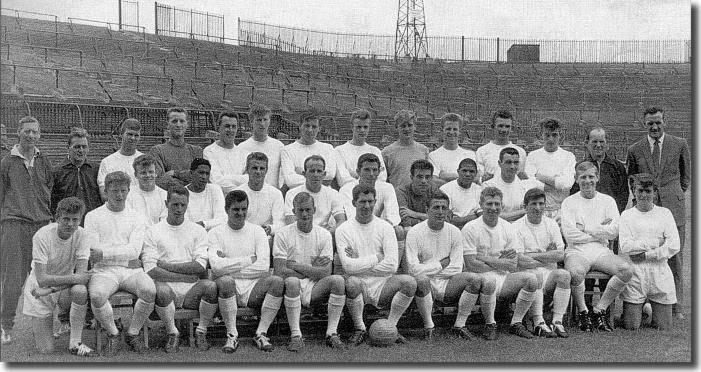 each
made interest-free loans of £3,500 to keep things going, gambling on improved
attendances. It was a suicidally over optimistic outlook: the club needed
attendances of 30,000 to break even, and crowds the previous season had
averaged less than 13,500. The final home game, a 2-2 draw with Scunthorpe,
drew just 6,975, the lowest League gate at Elland Road since the war.
Understandably, the Board would only sanction enough money in the close
season to purchase Preston right winger Derek Mayers. Arsenal's bid for
Billy Bremner in August could have eased matters, but Don Revie's insistence
that the youngster should stay was patiently indulged by the directors.
each
made interest-free loans of £3,500 to keep things going, gambling on improved
attendances. It was a suicidally over optimistic outlook: the club needed
attendances of 30,000 to break even, and crowds the previous season had
averaged less than 13,500. The final home game, a 2-2 draw with Scunthorpe,
drew just 6,975, the lowest League gate at Elland Road since the war.
Understandably, the Board would only sanction enough money in the close
season to purchase Preston right winger Derek Mayers. Arsenal's bid for
Billy Bremner in August could have eased matters, but Don Revie's insistence
that the youngster should stay was patiently indulged by the directors.
The Leeds public were cynical about a new era - 12,916 fans braved the
Purgatory of opening day at Elland Road to jeer the spotless new kits.
Bremner scored the only goal of the game against Charlton Athletic. The
Scot's effort was also decisive three days later, after an opener from
Noel Peyton, as Leeds won 3-1 at Brighton, with Mayers completing the
scoring.
These were heart warming victories, but old doubts resurfaced the following
weekend, as Leeds were trounced 5-0 at Anfield. Bill Shankly was moulding
a football revolution on Merseyside - Liverpool had finished third in
Division Two in each of the preceding two seasons and were on their way
to the title.
Scottish striker Ian St John was in sparkling form for the Reds, causing
endless problems for a pedestrian defence with his intelligence and mobility,
pulling the strings in a masterly demonstration. Liverpool were in no
mood to let the soft centred Leeds team spoil their day and simply played
them off the park.
It was a major setback for Revie and his men. Brittle confidence, which
had been nurtured during the summer, crumbled as the team went into free
fall, registering just two successes in the next 15 games. A 0-0 draw
at Elland Road against Leyton Orient on November 11 left Leeds second
from bottom with just 12 points from 17 matches.
John McCole had scored all four goals in the 4-1 win over Brentford in
the League Cup on September 13, demonstrating that he could still terrorise
defences. However, it was a swan song, and he was gone by the end of the
month, returning to Fourth Division Bradford City. Whether it was McCole's
choice, or a desperate attempt to supplement dwindling funds is not clear,
but Revie missed the Brentford win as he scouted for a replacement. The
transfer came as a shock, seemingly confirming that Leeds United had accepted
their role as eternal strugglers and a selling club.
Revie's short term solution was to thrust Jack Charlton into the forward
line, reasoning that his power in the air would be an asset. Charlton
did score goals, returning 9 in the league and three in the cups, but
he hated the experiment, bitching and moaning, with his reaction to an
early home defeat being pretty typical.
Leo McKinstry: 'In a game against Rotherham, Leeds had conceded a goal
in the first half from a header on the edge of the 18-yard box. Revie
was angry about this error and said so in his half-time talk, blaming
Jack for failing to pick up the centre forward. Jack, who thought the
keeper should have saved the header easily, was so resentful at this accusation
that he threw his teacup at Don Revie. It narrowly missed the manager,
smashing into the wall behind him. A stunned silence fell on the Leeds
dressing room, as Revie left the room without saying a word.'
However, the manager could at least console himself with the sustenance
of boardroom support and the potential of youth.
Harry Reynolds was a powerful advocate for Revie. The two men had formed
a strong attachment through hours of conversation and were shaping a vision
for the future. Reynolds was soon to be in a stronger position to emphasise
Revie's qualities.
With credit at the bank exhausted, Chairman Sam Bolton sought alternative
means to bolster the coffers, appealing to local businessmen for their
support. He managed to enlist the aid of Albert Morris, who ran Morris
Wallpapers, and Manny Cussins, the man behind the John Peters Furnishing
Group. Both men were supporters and happy to swell board membership, sinking
£10,000 apiece in further interest free loans. Sidney Simon was another
recruit onto the Board, as Stanley Blenkinsop stood down after 27 years
as a director, joining John Bromley as vice president, while the Earl
of Harewood was elected the first president of Leeds United.
Bolton sought without success for further recruits. Nevertheless, with
Harry Reynolds making £50,000 available from his personal fortune, the
club was guaranteed enough money to see it through the immediate future.
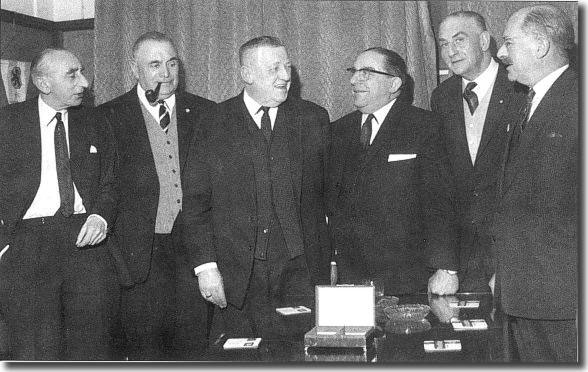 The
task of establishing sound financial foundations achieved, Sam Bolton
chose to step aside.
The
task of establishing sound financial foundations achieved, Sam Bolton
chose to step aside.
Bolton's energy had been sapped by years of penny pinching and struggle.
He resigned as chairman at the Annual General Meeting on 8 December, hinting
at his weariness: 'I have taken a lot of kicks, and I'm afraid I'm getting
to the point where I can't stand up to kicks like I used to.' The period
since the war had been 'one of anxiety, disappointment, hard work, financial
problems, staffing problems and a succession of unexpected difficulties'.
He implored supporters to give their backing to the board: 'Encourage
them, they are shouldering a big responsibility.'
There could only be one successor, as Harry Reynolds assumed the mantle
of leadership. He did so eagerly, encouraging Revie to outline his plans
for the future at the same AGM, commenting that he had 'never heard such
ideas better put. He will have all the backing the new Board and I can
give him. Without going into details, I can now say Don Revie has more
of the "sinews of war" - what we Yorkshiremen call brass - at
his disposal than his predecessors had. How much more must remain our
secret - the soccer market is as tricky a field of business to operate
in as you will find. I have all possible confidence in Don Revie who has
shown splendid balance and unsurpassable zeal in our recent weeks of adversity.'
Revie's vision was founded on attracting the best young players in the
country. He had taken Matt Busby's advice to heart and placed his faith
in the youth development policy introduced by his predecessors. Yorkshire
Post sports editor Richard Ulyatt offered his support: 'For years,
the club built the wrong way round. They constructed a team from the top
instead of from juniors ... far too often United have recruited with a
view to plugging gaps in the first team. The whole history of the Football
League suggests that the teams who last longest as match-winners are home
spun. I believe that Leeds United have reached the nadir of their fortunes
and will shortly start on the way up.'
back to top
The message became Revie's mantra and a regular theme of his contributions
to the club programme: 'The long-term outlook of this club must be based
upon youth. No players, however well intentioned and conscientious, can
possibly acquire the loyalty that all clubs need to the same degree as
those players who start their life with one club and develop throughout
the teams. We are basing our plans upon securing the best youngsters there
are available, and to that end all schools, youth and junior representative
matches are being watched and reported upon. Already we have a nucleus
of talent. You have seen Billy Bremner, the 18-year-old forward whom I
regard as the man most likely to succeed me as schemer of the forward
line. It may be that I shall continue to play until Billy is ready to
take over, but I regard his promise as so great that I do not consider
that date far advanced.
'We are in the throes of a financial and playing depression ... only
hard work, discipline, and clear thinking without prejudice can assist
us at least to retain our present status. There is anxiety but not panic
or despondency at Elland Road.'
He begged supporters to give him time and extolled the virtues of the
youngsters who were shining in the Northern Intermediate League: "'heir
average age is 16, but in this tough competition, our young team can more
than hold its won. Here are some of our lads: Gareth Sprake, goalkeeper,
16, from Swansea Schoolboys, who is going to be good ... right half Jimmy
Greenhoff, 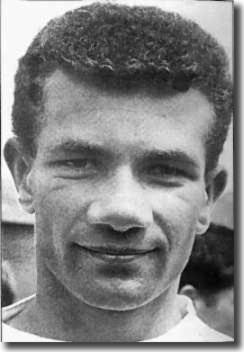 15,
star of the Barnsley Boys team which won the Yorkshire Cup and English
Schools' Shield last year ... Paul Reaney, a 17-year-old upstanding centre-half
and captain, a Leeds lad from the Leeds City Boys team ... Norman Hunter,
an 18-year-old inside-forward from Newcastle district has great ability.
Terry Cooper, a 17 year old outside left, is another apprentice of great
promise.
15,
star of the Barnsley Boys team which won the Yorkshire Cup and English
Schools' Shield last year ... Paul Reaney, a 17-year-old upstanding centre-half
and captain, a Leeds lad from the Leeds City Boys team ... Norman Hunter,
an 18-year-old inside-forward from Newcastle district has great ability.
Terry Cooper, a 17 year old outside left, is another apprentice of great
promise.
'We think we have a young team well worth watching - take a look and
judge for yourselves. But to get the best out of them, they must be brought
along gradually. It is of course frustrating to a football supporter to
be asked repeatedly to be patient but I am afraid that is what is required
... the history of football abounds with stories of clubs meeting with
success when the days looked darkest. In every instance it was to be found
that the people in charge were prepared to grasp success when the tide
began to flow their way.'
However, Revie knew he might not be around long enough to see potential
realised. In a vain bid to stem the tide of poor results, the manager
pulled on a white shirt and reappeared in midfield. But age had eroded
his ability and speed, and he could not compensate for the evident lack
of talent around him.
A bad run of goals conceded spelt the end for young goalkeeper Alan Humphreys,
whose confidence was rock bottom, but the replacement came as a shock
for many.
Andrew Mourant: 'Revie gambled on a player whom many people thought had
seen better days, goalkeeper Tommy Younger. Younger, who was past 30 and
overweight, had been playing in Canada and was recommended to Revie by
Stanley Matthews. He had also played previously for Liverpool and Stoke
and won Scottish international caps. But Revie was uneasy, not least because
Younger was reputed to be slack at training and a difficult temperament
to handle. Moreover, two years earlier, Younger had slipped a disc at
Stoke City and been advised to stop playing. Yet he vowed to do his best
for Revie, and after signing from Toronto City in September 1961, rapidly
shed two stone, forcing his way into the first team.'
Spirit was poor, but in December Revie signed his former Manchester City
team mate, Billy McAdams from Bolton Wanderers, hinting at a possible
remedy. The Belfast-born forward scored 20 goals in 31 matches for City
in 1959-60, and followed up with 16 in 27 for Bolton. However, at Elland
Road he struggled to find his form, returning just 3 goals from his 11
appearances. In common with the other forwards, McAdams was guilty of
"missing so many chances it wasn't true", according to team mate Eric
Smith, and the Irishman moved on to Brentford for £8,000 at the end of
the season.
back to top
The absence of the fleet footed South African left winger Albert Johanneson
forced Revie to persevere with former England youth player John Hawksby.
Hawksby scored in his first two games for the club in August 1960, but
had failed to find the net ever since. As Revie said, 'John has yet to
make his position in the club secure. In Central League matches and in
training, he is outstanding but on the field in the cut and thrust of
the Football League, his skill is not as apparent.' With McCole gone and
McAdams struggling, the forward line had little bite, and Billy Bremner
was to finish leading scorer with just eleven goals.
However, if the strike force was unproductive, the defence had consolidated,
with some encouraging displays. Leeds' problems over the last two years
were at the back, with 175 goals conceded. The rearguard was by no means
watertight, but had stabilised. In front of Younger, Grenville Hair retained
the right-back slot, while Revie had converted former Queen's Park wing-half
Willie Bell to left- back, with the
robust Freddie Goodwin in the centre alongside Smith.
However, things looked particularly bad for Leeds United and there was
a trap door to the Third Division beneath their feet ...
Part 2 - The Difference












 rightly
identified the lack of team spirit as a deep rooted cancer. He decided
to do away with pay differentials between first team players, opting instead
to improve incentives.
rightly
identified the lack of team spirit as a deep rooted cancer. He decided
to do away with pay differentials between first team players, opting instead
to improve incentives. each
made interest-free loans of £3,500 to keep things going, gambling on improved
attendances. It was a suicidally over optimistic outlook: the club needed
attendances of 30,000 to break even, and crowds the previous season had
averaged less than 13,500. The final home game, a 2-2 draw with Scunthorpe,
drew just 6,975, the lowest League gate at Elland Road since the war.
Understandably, the Board would only sanction enough money in the close
season to purchase Preston right winger Derek Mayers. Arsenal's bid for
Billy Bremner in August could have eased matters, but Don Revie's insistence
that the youngster should stay was patiently indulged by the directors.
each
made interest-free loans of £3,500 to keep things going, gambling on improved
attendances. It was a suicidally over optimistic outlook: the club needed
attendances of 30,000 to break even, and crowds the previous season had
averaged less than 13,500. The final home game, a 2-2 draw with Scunthorpe,
drew just 6,975, the lowest League gate at Elland Road since the war.
Understandably, the Board would only sanction enough money in the close
season to purchase Preston right winger Derek Mayers. Arsenal's bid for
Billy Bremner in August could have eased matters, but Don Revie's insistence
that the youngster should stay was patiently indulged by the directors. The
task of establishing sound financial foundations achieved, Sam Bolton
chose to step aside.
The
task of establishing sound financial foundations achieved, Sam Bolton
chose to step aside. 15,
star of the Barnsley Boys team which won the Yorkshire Cup and English
Schools' Shield last year ... Paul Reaney, a 17-year-old upstanding centre-half
and captain, a Leeds lad from the Leeds City Boys team ... Norman Hunter,
an 18-year-old inside-forward from Newcastle district has great ability.
Terry Cooper, a 17 year old outside left, is another apprentice of great
promise.
15,
star of the Barnsley Boys team which won the Yorkshire Cup and English
Schools' Shield last year ... Paul Reaney, a 17-year-old upstanding centre-half
and captain, a Leeds lad from the Leeds City Boys team ... Norman Hunter,
an 18-year-old inside-forward from Newcastle district has great ability.
Terry Cooper, a 17 year old outside left, is another apprentice of great
promise.